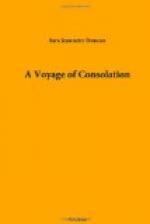“So you’ve been reading the New York World,” I said kindly.
“I have read, yes, two avertissimi. Not more, I fear. But they are also amusing, the avertissimi.” His voice was certainly agreeably deferential, with a note of gratitude.
“Now, if you wouldn’t mind taking the corner opposite my daughter, Count Filgiatti,” put in poppa, “you and she could talk more comfortably, and Mrs. Wick could put her feet up and get a little nap.”
“I am too happy if I shall not be a trouble to Mees,” the Count responded, beaming. And I said, “Dear me, no; how could he?” at which he very obligingly changed his seat.
I hardly know how we drifted into abstract topics. The Count’s English was so bad that my sense of humour should have confined him to the weather and the scenery; but it is nevertheless true that about an hour later, while the landscape turned itself into a soft, warm chromo in the fading sunset, and both my parents soundly slept, we were discussing the barrier of religion to marriage between Protestants and Roman Catholics. I did not hesitate to express the most liberal sentiments.
“Since there are to be no marriages in heaven,” I said, “what difference can it make, in married life, how people get there?”
“The signor and signora think also so?”
“Oh, I daresay poppa and momma have got their own opinions,” I said, “but that is mine.”
“You do not think as they!” he exclaimed.
“I don’t know what they think,” I explained. “I haven’t asked them. But I’ve got my own thinker, you know.” I searched for simple expressions, and I seemed to make him understand.
“So! Then this prejudice is dead for you, Senorita—mees?”
“I like ‘Senorita’ best,” I said. “I believe it is.” At that moment I divined that he was a Roman Catholic. How, I don’t know. So I added, “But I’ve never had the slightest reason to give it a thought.”
“That must be,” he said softly, “because you never met, Senorita—may I say this?—one single gentleman w’at is Catholic.”
“That’s rather clever of you,” I said. “Perhaps that is why.”
The Italian character struck me as having interesting phases, but I did not allow this impression to appear. I looked indifferently out of the window. Italian sunsets are very becoming.
“The signora, your mother, has told me that you have no brothers or sisters, Mees Wick. She made me the confidence—it was most kind.”
“There never has been any secret about it, Count.”
“Then you have not even one?” Count Filgiatti’s eyes were full of melancholy sympathy.
“I think,” I said with coldness, “that in a matter of that kind, momma’s word should hardly need corroboration.”
“Ah, it is sad! With me what difference! Can you believe of eleven? And the father with the saints! And I of course am the eldest of all.”




